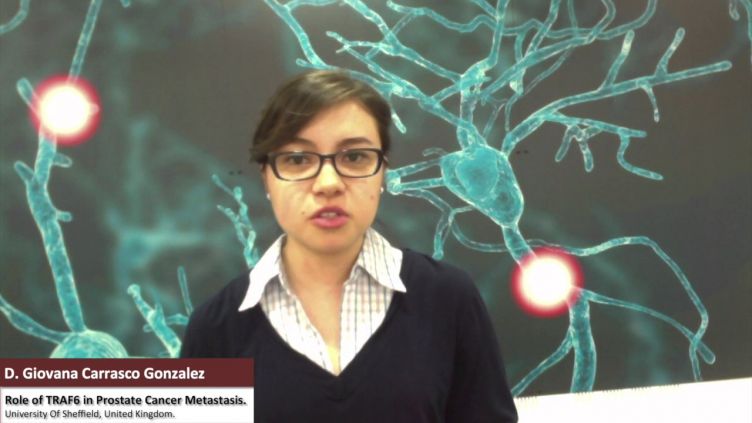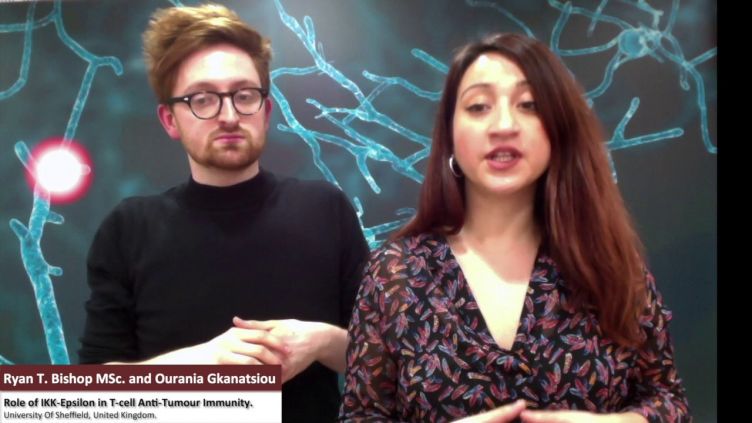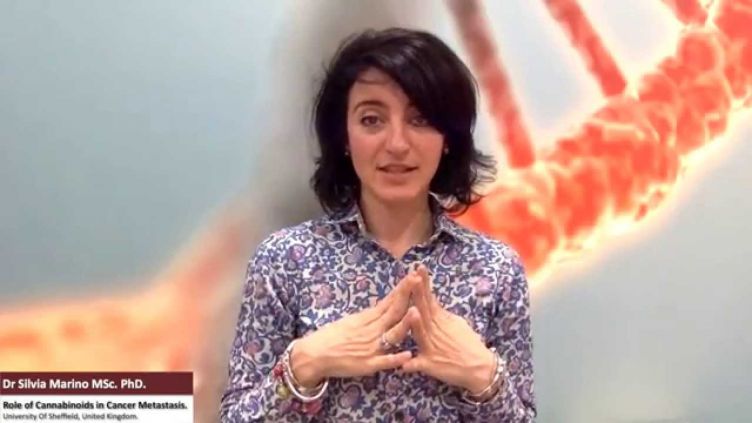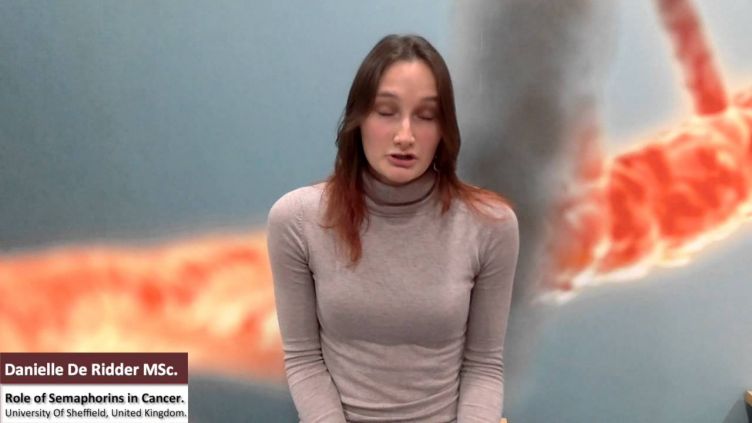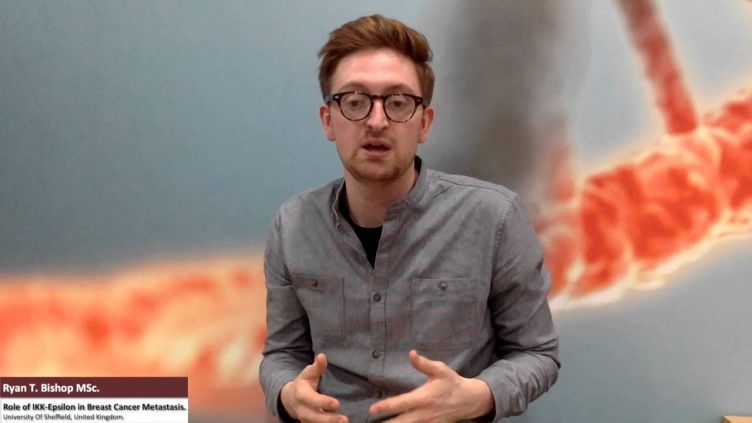Musculoskeletal Pharmacology Research Group
Dr Aymen Idris Research Projects
Targeting NFkB for the Treatment of Prostate Cancer Metastases. Presented by Miss Danielle De Ridder & Mr Edward Stickland.
The majority of deaths from cancer following conventional therapies are a result of metastases. TRAF6, a key component of NFkB pathway, is implicated in tumour growth, metastasis and bone metabolism. Miss De Ridder's and Mr Stickland’s work is to test the effects of pharmacological inhibition and genetic manipulation of TRAF6/NFkB signalling – alone or in combination with conventional anti-cancer therapies- on tumour growth, metastasis and anti-tumour immunity in humanized and syngeneic mouse models of osteosarcoma. If successful, the findings of this research will have translational potential in identifying NFkB inhibitors - alone or in combination therapy - for the treatment of metastatic osteosarcoma. This addresses a huge unmet clinical need, as metastasis and acquired resistance to conventional anti-cancer therapy are major clinical problems in osteosarcoma patients with lung metastasis.
Targeting TRAF6 for the Treatment of Prostate Cancer Metastases. Presented by Miss D. Giovana Carrasco Gonzalez.
Prostate cancer is the most common type of cancer in men and is the fifth leading cause of cancer death worldwide. The majority of deaths from prostate cancer following conventional therapies are a result of metastases. TRAF6, a key component of NFkB pathway, is implicated in tumour growth, metastasis and T-cell exhaustion in prostate cancer. The aims of Miss Carrasco-Gonzalez’s PhD is to test the effects of pharmacological inhibition and genetic manipulation of TRAF6 – alone or in combination with conventional anti-cancer therapies- on tumour growth, metastasis and anti-tumour immunity in humanized and syngeneic mouse models of prostate cancer, and determine the mechanism by which TRAF6 influences prostate cancer tumorigenesis and metastasis. If successful, the findings of this research will have translational potential in identifying TRAF6 inhibitors - alone or in combination therapy - for the treatment of metastatic prostate cancer. This addresses a huge unmet clinical need, as metastasis and acquired resistance to conventional chemotherapeutic agents are major clinical problems.
IKK Epsilon in T-Cell Anti-Tumour Immunity in Breast Cancer. Presented by Mr Ryan Bishop MSc. & Miss Ourania Gkanatsiou.
The majority of deaths from cancer following conventional therapies are a result of metastases. The IKK subunit Epsilon is a key protein in NFkB signalling pathway and it has been found to play a key role in signal transduction in mammalian cells. Several members of the IKK family have been discovered but IKK-Epsilon has been identified as a breast cancer oncogene. Mr Bishop's PhD and Miss Gkanatsiou‘s MSc work will attempt to establish whether pharmacological inhibition of IKK- Epsilon enhances and restores T-cell activation and anti-tumour activity against breast cancer cells. This addresses a huge unmet clinical need, as metastasis and acquired resistance to conventional anti-cancer therapies areProstate cancer is the most common type of cancer in men and is the fifth leading cause of cancer death worldwide. The majority of deaths from prostate cancer following conventional therapies are a result of metastases. TRAF6, a key component of NFkB pathway, is implicated in tumour growth, metastasis and T-cell exhaustion in prostate cancer. The aims of Miss Carrasco-Gonzalez’s PhD is to test the effects of pharmacological inhibition and genetic manipulation of TRAF6 – alone or in combination with conventional anti-cancer therapies- on tumour growth, metastasis and anti-tumour immunity in humanized and syngeneic mouse models of prostate cancer, and determine the mechanism by which TRAF6 influences prostate cancer tumorigenesis and metastasis. If successful, the findings of this research will have translational potential in identifying TRAF6 inhibitors - alone or in combination therapy - for the treatment of metastatic prostate cancer. This addresses a huge unmet clinical need, as metastasis and acquired resistance to conventional chemotherapeutic agents are major clinical problems. major clinical problems in advanced breast cancer patients.
Role of Cannabinoids in Metastasis. Presented by Dr Silvia Marino MSc. PhD.
The majority of deaths from cancer following conventional therapies are a result of metastases. The endocannabinoid system is involved in the regulation of a variety of physiological processes including inflammation, bone metabolism and cancer. Dr Marino's work will build on our group previous work on the role of the endocannabinoid system in bone, and attempt to establish whether small molecule inhibitors that selectively target and inhibit the endocannabinoid system might be of value in the treatment of advanced cancer. This addresses a huge unmet clinical need, as metastasis and acquired resistance to conventional anti-cancer therapy are major clinical problems in cancer patients with bone metastasis.
Previous Publications
Marino S, et al. J. Bio Chem. 2015; 4:290(36): 22049-60. [PubMed]
Role of Semaphorins in Metastasis and Pain. Presented by Miss Danielle De Ridder MSc.
The majority of deaths from cancer following conventional therapies are a result of metastases. Semaphorins and their receptors are involved in the regulation of a variety of physiological processes including cell movement and bone metabolism. Miss De Ridder's work will build on our group previous work on the role of Sema-3A in breast cancer-induced osteolysis (De Ridder etal. 2015), and attempt to establish whether administration of Semaphorins and similar peptides might be of value in the reduction of metastasis, inhibition of bone loss and attenuation of pain. This addresses a huge unmet clinical need, as metastasis and acquired resistance to conventional anti-cancer therapy are major clinical problems in cancer patients with bone metastasis.
Previous Publications
De Ridder D, et al. Bone. 2015; P105. [PubMed]
Role of TRAF in Cancer Associated Bone Disease. Presented by Dr Silvia Marino MSc. Ph.D. and Mr Ryan Bishop MSc.
The majority of deaths from cancer following conventional therapies are a result of metastases. Tumour necrosis factor receptor associated factors (TRAFs) play a key role in signal transduction in mammalian cells. Several members of the TRAF family have been identified but only TRAF2 and TRAF6 are implicated in the regulation of osteoclastogenesis. Dr Marino's and Mrs Bishop's work will attempt to establish whether small molecule inhibitors that selectively target and inhibit TRAF6 might be of value in the treatment of advanced cancer. This addresses a huge unmet clinical need, as metastasis and acquired resistance to conventional anti-cancer therapy are major clinical problems in cancer patients with bone metastasis.
Previous Publications
Peramuhendige P, Marino, S, et al. Bone. 2014; 3(S1):97. [PubMed]
Peramuhendige P, Marino, S, et al. Bone. 2012; 50(S1): 61 - 62. [PubMed]
Role of the IKK Epsilon Subunit in Breast Cancer Metastasis. Presented by Mr Ryan Bishop MSc.
The majority of deaths from cancer following conventional therapies are a result of metastases. The IKK subunit Epsilon is a key protein in NFkB signalling pathway and it has been found to play a key role in signal transduction in mammalian cells. Several members of the IKK family have been discovered but IKK-Epsilon has been identified as a breast cancer oncogene. Mr Bishop's work will attempt to establish whether small molecule inhibitors that selectively target and inhibit IKK- Epsilon might be of value in the treatment of advanced breast cancer. This addresses a huge unmet clinical need, as metastasis and acquired resistance to conventional anti-cancer therapy are major clinical problems in breast cancer patients with bone metastasis.
Role of the IKK Alpha Subunit in Prostate Cancer Metastasis. Presented by Mr Abdullah Al Jeffery MSc.
The majority of deaths from cancer following conventional therapies are a result of metastases. The IKK subunit Alpha is a key protein in NFkB signalling pathway and it has been found to play a key role in signal transduction in mammalian cells. Several members of the IKK family have been identified but IKK-Alpha is implicated in the regulation of both prostate cancer and osteoclastogenesis. Mr Al Jeffery's work will attempt to establish whether small molecule inhibitors that selectively target and inhibit IKK-Alpha might be of value in the treatment of advanced prostate cancer. This addresses a huge unmet clinical need, as metastasis and acquired resistance to conventional anti-cancer therapy are major clinical problems in prostate cancer patients with bone metastasis.
Role of the IKK Beta Subunit in Breast Cancer Metastasis. Dr Silvia Marino MSc. PhD.
The majority of deaths from cancer following conventional therapies are a result of metastases. The IKK subunit Beta is a key protein in NFkB signalling pathway and it has been found to play a key role in signal transduction in mammalian cells. Several members of the IKK family have been discovered but IKK-Beta is implicated in the regulation of both cancer and bone disease. Dr Marino’s work will attempt to establish whether small molecule inhibitors that selectively target and inhibit IKK-Beta might be of value in the treatment of advanced breast cancer. This addresses a huge unmet clinical need, as metastasis and acquired resistance to conventional anti-cancer therapy are major clinical problems in breast cancer patients with bone metastasis.
Previous Publications
Marino, S, et al. Bone. 2012; 3(S1): OC5.2. [PubMed]


